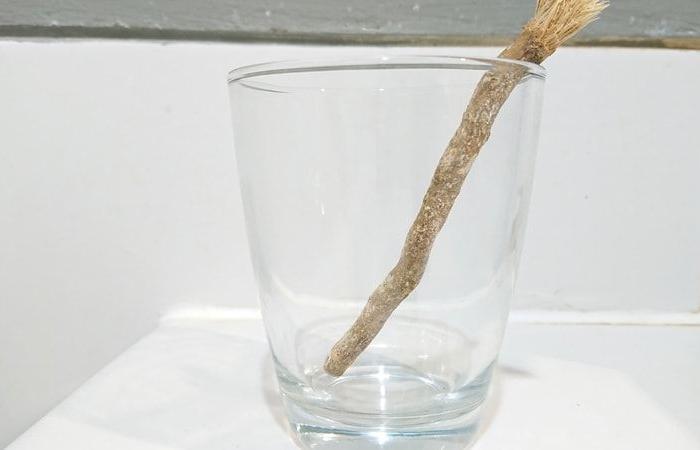The letter to the editor from Husseini MO and Alangri AA, two pediatricians from Riyadh (Saudi Arabia) arouses interest because it concerns the potential allergic risks of a health procedure that is normally carried out several times a day: brushing your teeth. The miswak, also called meswak, siwak or araq stick (or arak), has been used for centuries, in the form of sticks, for cleaning and brushing teeth to which it would give a dazzling whiteness.
Miswak toothpaste
Miswak is obtained from the roots of a small evergreen shrub, Salvadoran peachesvery widespread in the south and west of the mountainous areas of Saudi Arabia, but also in Africa and India. Miswak has many benefits for oral hygiene, including anti-plaque, antibacterial, anti-mycotic and analgesic activities.
In the current context where the whiteness of teeth is valued and associated with good health, several toothpastes have included Salvadoran peaches in their formulations in many countries around the world: Sarakan Toothpaste© (UK), Quali-miswak© (UK), Epident© (Egypt), Siwak-F© (Indonesia), Dentacare-miswak© (Saudi Arabia). The “advertisement” promises us : « Regular brushing with Sarakan toothpaste helps restore the natural color of your teeth, leaving them exceptionally clean and smooth and your mouth naturally fresh ». Additionally, this toothpaste is flavored with natural oils of peppermint, clove and geranium, an addition that helps refresh the mouth. This is an opportunity to remember that the most numerous and most powerful allergens are widely represented in plants.
A review of the literature tells us that miswak has been incriminated in two cases of oral allergy syndrome in the form of gingival itching. Husseini and Alangri's observation is the first case of anaphylaxis occurred in an atopic child, having previously presented episodic asthma attacks, and suffering from multiple food allergies since early childhood (to egg, peanut and sesame) validated by prick tests (PT) and positive serum specific IgE (IgEs) assays.
Two episodes of anaphylaxis
At the age of 10, this child developed an episode of facial urticaria with angioedema and stridor, immediately after using miswak for the first time. Three or four months later, he used miswak again and immediately experienced more severe symptoms of anaphylaxis involving cough, dyspnea, in addition to urticaria and angioedema.
For these two episodes of anaphylaxis, the anamnesis did not find any other triggering factor apart from the miswak. These symptoms disappeared within a few hours: an adrenaline auto-injector had been prescribed but it was not available!
Miswak PT was positive in this patient (induration of the papule: 5 mm).
In order to validate this miswak prisk test, the authors carried out PT using the same technique in healthy volunteers, 30 adults aged 25 to 51, of whom 20 had used and tolerated miswak and 10 had never been exposed to it.
Among the subjects who had already used miswak, 11 were men and 9 women. Atopy was diagnosed in 8 of them (40%): two of them suffered from allergic rhinitis (AR) and asthma, one from AR and atopic dermatitis (AD), two from AR alone, another had RA and a food allergy (AA) to egg and chicken, one with isolated asthma, the last had simple dermographism which, it should be noted, is not a sign of atopy . All participants who had never been exposed to miswak were women. In these controls, atopy was present in 3 (30%) of them: one control with asthma, RA and shrimp AA, another with AD + RA, and the last only AD. All controls had a negative miswak PT.
This observation comes at the right time to warn against the use of miswak-based toothpastes, even if their use does not appear to be widespread. A fad could lead to fears that miswak will become an emerging allergen.
The quest for Hollywood whiteness
An internet query with the question “ How to quickly get white teeth? » provides a large number of varied answers… We must not forget that smoking, vaping, the use of certain oral disinfectants and certain medications are the cause of a change in the color of the teeth, without forgetting the essential factor: poor oral hygiene
In this regard, it should be remembered that brushing your teeth should be done twice (or even three times) a day, for at least 3 minutes. You should not brush your teeth immediately after eating as this can affect the enamel.
A number of toothpastes contain miswack. Any gingival itching occurring during the use of this type of toothpaste therefore constitutes a warning symptom and should prompt consultation. an allergist, especially if the subject has pollen and/or food allergies. Apart from the development of an IgEs dosage, the reference PT seems to us to be the prick plus prick: prick of the root and prick of the skin using a typical needle Stallerpoint© or other.






